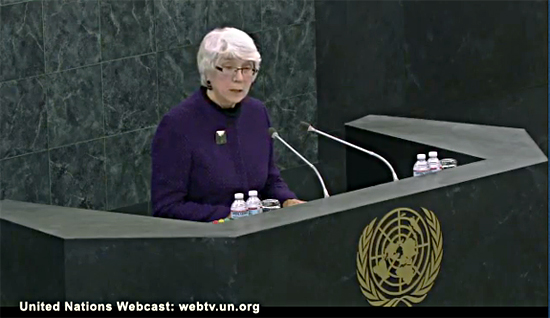Anyone involved in the sausage-making of law and policy knows one small ingredient can affect the entire product. The United Nations is no exception.
On December 9, Pace Law School professor Ann Powers, representing the International Union for the Conservation of Nature (IUCN), presented a statement at the United Nations General Assembly regarding just one paragraph of a 280-paragraph UN resolution on oceans and law of the sea. But it is a crucial paragraph.
Paragraph 201 threatens to restrict the involvement of citizen and intergovernmental organizations in proceedings that determine changes to the UN Convention on Law of the Sea. As we have written in these pages, Law of the Sea has crucial implications for international waters, such as the Arctic where saber rattling and militaristic build-up could escalate US-Russian tensions over oil and mineral rights (EarthDesk, Cold War at the Top of the World). In addition, non-governmental and international organizations, universities, and private research institutes arguably have a combined expertise far greater than that of UN member States.
Professor Powers’ IUCN statement at the General Assembly debate offers a rare insight into the only global deliberative body considering the future of the planet’s oceans, and is itself testimony to the vital role citizens play in those deliberations. More on Ann Powers and IUCN at the conclusion of her statement.
President,
IUCN, the International Union for Conservation of Nature, welcomes the draft resolution on ‘Oceans and the law of the Sea’ which reaffirms the commitment to Paragraph 162 of the Rio+20 outcomes. IUCN also welcomes the progress made to address, on an urgent basis, the issue of the conservation and sustainable use of marine biodiversity of areas beyond national jurisdiction, including a decision on the development of an international instrument under the United Nations Convention on the Law of the Sea.
IUCN further welcomes the process established within the Ad Hoc Open-ended Informal Working Group to prepare for a decision to be taken at or before the 69th session of the General Assembly, including the exchange of views on the scope, parameters and feasibility of an international instrument under the Law of the Sea Convention.
We are deeply concerned, however, with the retreat from transparency and open debate reflected in the exclusion of civil society from significant discussions during the most recent of the Working Group meetings, contrary to the spirit of Rule 60 of the Rules of Procedure of the General Assembly which states that:
The meetings of the General Assembly and its Main Committees shall be held in public unless the organ concerned decides that exceptional circumstances require that the meeting be held in private.
While recognizing the prerogative of Member States to define what is meant by “exceptional circumstances”, and appreciating the value of the occasional closed meeting for facilitating a meeting of the minds, IUCN believes that on matters of common concern and global interest such as marine biodiversity beyond national jurisdiction, non-public meetings should be an exception. As the high seas and seabed Area comprise nearly 50% of the planet, it is critical that civil society have a voice in ensuring that the interests of both State and non-State actors are heard.
Distinguished delegates, IUCN recalls that in paragraph 76 (h) of the Rio+20 outcome document “The future we want”, it was agreed to:
Enhance the participation and effective engagement of civil society and other relevant stakeholders in the relevant international forums and, in this regard, promote transparency and broad public participation and partnerships to implement sustainable development.
If the circulation of States’ views is restricted, as foreseen under Paragraph 201 of the draft resolution, or if IGOs and NGOs are excluded from significant portions of future meetings of the Working Group, the ability of civil society and other stakeholders to effectively prepare for and engage in the Working Group process will be hindered. This would set an unfortunate precedent for further meeting on oceans affairs, and have broader ramifications on IGO and NGO participation at future meetings within the United Nations system. It would also run counter to a shared view of governments for greater inclusion and participation by civil society as most recently voiced in the Rio+20 outcome document.
As is recalled in paragraph 195 of the current draft resolution, the Working Group has benefited from the technical expertise and substantive input provided by civil society at the intercessional workshops held in May 2013, and throughout the work of the Working Group. In addition, many governments also benefit, rely on and welcome the technical expertise and varied points of view provided by civil society.
IUCN therefore urges Member States to recognize the importance of involving civil society in the substantive discussions of the Working Group and ensuring that civil society have timely access to the information needed both to provide substantive input and to represent those otherwise not here who care deeply about the health, productivity and resilience of the global ocean and its contribution to sustainable development for the benefit of present and future generations.
Thank you, President
The entire UN resolution is here. The full video of the proceedings can be viewed here.
«« »»
 Professor Ann Powers is a faculty member of the Center for Environmental Legal Studies, where she teaches a range of environmental courses focusing on the law of oceans & coasts, international environmental law, UN diplomacy and water quality. Her scholarship includes emerging ocean issues and water pollution trading programs, among other subjects.
Professor Ann Powers is a faculty member of the Center for Environmental Legal Studies, where she teaches a range of environmental courses focusing on the law of oceans & coasts, international environmental law, UN diplomacy and water quality. Her scholarship includes emerging ocean issues and water pollution trading programs, among other subjects.
Professor Powers’ recent work has focused particularly on ocean and international issues, and she has worked with United Nations Environment Program projects, and the International Union for Conservation of Nature’s (IUCN) Commission on Environmental Law and its Law Academy. She chairs the Land-based Pollution Subcommittee of the Commission’s Oceans, Coasts & Coral Reefs Specialist Group. Read more about Ann here.
 The mission of the International Union for the Conservation of Nature is to influence, encourage and assist societies throughout the world to conserve the integrity and diversity of nature and to ensure that any use of natural resources is equitable and ecologically sustainable.
The mission of the International Union for the Conservation of Nature is to influence, encourage and assist societies throughout the world to conserve the integrity and diversity of nature and to ensure that any use of natural resources is equitable and ecologically sustainable.
Its work builds upon IUCN’s niche as the world’s authority on biodiversity conservation, nature-based solutions and related environmental governance. It has three key areas: valuing and conserving nature, effective and equitable governance of nature’s use, and deploying nature-based solutions to global challenges in climate, food and development. More on IUCN here.










